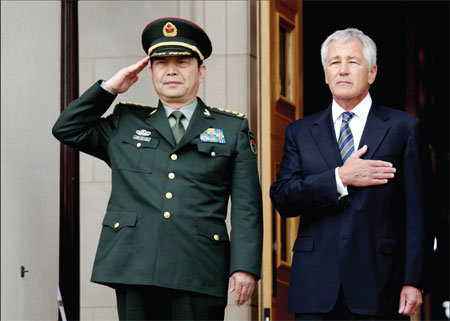The "rebalancing" of US attention, activities and forces toward the Pacific as it has been officially announced and pursued by the White House, US foreign policy and the Pentagon since the beginning of 2012 has aroused concerns in Beijing with regard to the actual intentions behind this change in strategy.
China fears that the entire "strategic turnabout" of the United States from the Atlantic to the Pacific could primarily be to impede China's further ascendancy in order to keep China as weak as possible for the in the eyes of a few very conservative US strategists inevitably imminent confrontation in the Pacific.

Chinese Minister of Defense Chang Wanquan at the Pentagon on Aug 19, 2013 with host US Secretary of Defense Chuck Hagel to talk about rebalancing of US policy. Sun Chenbei / China Daily
Conversely, many Western especially US politicians fear that with its tremendous potential China could not only become an economic danger but also militarily oust the US from its leadership and regulatory role in the long term.
A conference which the Chinese Charhar Institute and the Swiss Media Tank Foundation earlier this year in Zhangjiakou, not far from Beijing, was devoted to handling uncertainties pertaining to mutual perceptions of intentions.
As became clear at this meeting, on the Chinese side there is a great need for explanation with regard to the historical role of the Middle Kingdom as well as the current military and security policy aspirations.
The initiation of trust-building measures on a strategic level, specifically and first and foremost in the relationship with the US, is up for discussion.
The meeting between presidents Barack Obama and Xi Jinping in California in June in which minor corresponding resolutions were also immediately adopted also pursued this objective.
The summit meeting attracted astonishingly little attention in the US media, at any rate less than the disclosures of Internet intelligence expert Edward Snowden about US cyberhackers or the demands by Senator John McCain for the White House to finally arm the Syrian rebels. This was due to the fact that both heads of state viewed the meeting as "strategic", i.e. without obligation, to concretely solve urgent problems. In fact, they wanted to lay a foundation for a collaboration reaching far into the future.